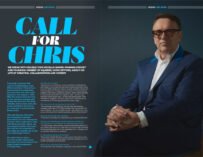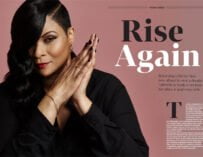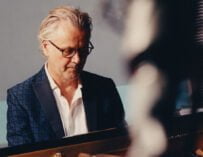
After years working behind the scenes with a host of big names, this unassuming singer-songwriter is stepping into the limelight
When we received a copy of Helen Boulding’s new single Jerusalem, one thing in particular jumped out at us immediately. It wasn’t anything about the Fleetwood Mac-meets-electropop stylings of the song itself; it wasn’t the fact that it’s featured in forthcoming movie Comes A Bright Day; it wasn’t even Helen’s striking good looks. No, it was the artist biography accompanying the release, which informed us almost glibly that the Sheffield native has worked with everyone from pop acts like 90s boyband 911 and Neighbours starlet Holly Valance, to Youth of Killing Joke, Phil Thornalley of The Cure, Chris Difford of Squeeze and Rick Wright of Pink Floyd.
That’s quite a CV, we’re sure you’ll agree – especially for an artist who’s never troubled the charts (at least not under her own name). Intrigued, we picked up the phone to find out more…
You signed with Warner-Chappell as a songwriter at the tender age of 17… that’s almost unheard of! How did that come about?
“That was a bit of a fluke, actually. I never had any intention of writing songs for other people… I’d been sending out demos to record companies of myself as a singer-songwriter. I’d been playing piano since the age of 7 – reluctantly at first! – and writing songs since I was 11 and, having made up my mind this was what I wanted to do, I’d started going to Red Tape in Sheffield, which is a council-run studio and media complex… there’d be panels where industry experts would come and talk about how to get into the music industry. Through doing that I’d met Michael Stack from ASCAP and given him a demo, and he hooked me up with a manager called Ian Allan, and Ian played some of my stuff to Mike Sault at Warner Chappell and he said he loved my songs but loved me as an artist too and so would be interested in developing me as both. In the meantime I had co-written a track for a boyband who were touring up north and starting to make some waves”
And that boyband was 911, presumably?
“It was… I signed with Warner Chappell in November 1996, and in February 1997 they went in at number 4 with their recording of The Day We Found Love. And suddenly I was inundated with offers to write for boybands! I turned down most of them. These days I’m not so precious, I think a good song’s a good song – as long as your intentions are pure when you write it, it doesn’t really matter what life it takes on afterwards. But at the time I was in a bit of a rebellious phases, I guess, and didn’t want to get pigeon-holed just writing for boybands.
“So I left Ian Allen’s management – he was a good manager but he was too much in the pop world for where I wanted to be, I wanted to be seen as a serious artist – and I did a series of showcase gigs where I invited along a load of managers. And one of them was Jazz Summers, who managed The Verve, and he took me on… and that’s how I met Youth, because Jazz was working with him at the time. And Youth and I have been working together ever since.”
[cc_blockquote_right] THE SESSION WAS ME, CHRIS DIFFORD AND RICK WRIGHT – I MUST ADMIT I WAS A BIT OVER-AWED! [/cc_blockquote_right]What about some of your other high-profile collaborators – can you tell us how you came to be working with them?
“Well, Phil Thornalley was actually one my first co-writers, I guess – I met him through Ian Allen. And then Chris Difford and Rick Wright, both of those I met when I went on one of Chris’s writing weeks. He used to organise these writing weeks where you’d all go stay at this big country house, Huntsham Hall. And you’d be completely cut off from the outside world, but there was a piano in every room, and every day you’d be put in small groups and you’d have to write a song together; then in the evening you’d all get together and perform them to each other. They’d do this every two years: I think the first time I went was in 1998 and I went for about three times after that. I believe Chris now does a similar thing in Italy or somewhere. So yeah, the first time I went along, one day the group was me, Chris Difford and Rick Wright! I must admit I was a bit over-awed but actually Rick turned out to be the nicest, humblest, sweetest guy you could meet. It was actually a very easy session!”
Is it fair to say then that, with all that background, you’ve got your ‘songwriting technique’ pretty much down pat?
“Well, it’s like anything really. If you’re an athlete – which all my brothers and sisters are – then you have days where you go out to compete and everything just flows. When you’re writing a song purely for its own sake and you’re loving it, it’s like that. When you’re writing ‘to order’, that’s a bit different – there are certain lyrical devices or chord changes you know will always work and stuff like that, but it can still be hard work.
“That’s why I try and do as little ‘jobbing’ songwriting as I can these days. If you have to think about it, it doesn’t work as well! That said, a lot of it’s about connecting with people. For instance, when my manager said he wanted me to write a song for a girl on Fame Academy, I wasn’t convinced. But I went along and met Alex [Parks, for whom Helen wrote Top 3 single Maybe That’s What It Takes] and she was like a little Sinead O’Connor, and we got on like a house on fire. We had very little time to work together but because we got along so well, it just worked.
“There is a craft part to it, certainly, like going from one particular chord to another at the bridge will always work… but it’s when you really gel with someone and you get beyond that, that’s when it gets good.”
[cc_blockquote_right] USUALLY IT STARTS WITH ME POOTLING ABOUT ON THE PIANO [/cc_blockquote_right]Is there a particular way you usually write – for instance, do the lyrics or the tune come first?
“It varies to some degree, but usually for me it starts with me pootling about on the piano. I’ll come up with a chord sequence, and that’ll lead on to a melody… and then the lyrics will be written to fit the melody. Not always, but that’s usually how it happens.”
And now you’ve got an album out under your own name, Calling All Angels. It’s actually your second album though, is that right?
“Yeah, the first album New Red Dress came out in 2007. It got a lot of plays on Radio 2 – the singles were playlisted and it won ‘Album of the Week’. It didn’t do a lot commercially, but I was more happy with it being critically acclaimed at this point, as I’d proved I could write hits and so was hoping for more credibility, which came with this album. That was co-written with Phil Thornalley and Youth, among others, and Youth produced it. But then writing for other people and touring with other people (playing piano on tracks I’d written) kind of got in the way, so it’s only now I’ve found time to get another album out.
“With this album, I really wanted to work with Pete Glenister [Alison Moyet, Kirsty McColl]. We’d worked on stuff for other people and I just loved the way Pete’s got a real ear for details – we’d work on stuff for ages, trying out different chord progressions and stuff. So eventually we just sat down and wrote an album together! We were listening to a lot of Goldfrapp at the time and I think you can hear those influences in the record – kind of grown-up pop with dance-y leanings. It’s quite electronic compared to the first album, but it’s still very song-based… and still quite pop. Pop isn’t a dirty word for me. I love great pop.”
What can you tell us about the single, Jerusalem?
“Well, I wrote that song after taking the tube to Crouch End one day. I looked around the train and everyone was sitting there looking so miserable and withdrawn into themselves. And yet outside the window it was one of those beautiful crisp, cold autumn days, one of those days where the world feels full of possibilities. So the song’s a celebration of life, really.”
 So are you hoping that stardom will now beckon?
So are you hoping that stardom will now beckon?“Do you know what… yeah, at one time I’d have loved to be big star. Like when I was sending out demos as a teenager – what teenage girl doesn’t dream of being a pop star? These days though, it’s really more important to me to do something I can be proud of, something that’s from the heart and 100 per cent me. If that is then commercially successful then that’s a bonus, as I’d like my music to reach as many people as possible – having success enables you to carry on making the music you love. Calling All Angels is coming out through my own label, Maid In Sheffield – that way I can be in control of the artwork, the styling and everything. It’s harder work but… well I’ll give you a for instance, at one early stage when I was recording the first album, it was going to come out on another label – I won’t say who – and they wanted me in hair extensions and stuff. Which wasn’t me at all. This way, it’s harder work but it’s all on my own terms, and like I said, it’s about creating something I can be really proud of.
“That said… success and lots of money wouldn’t go amiss if it happened!”
So, international superstardom aside, what else does the future hold?
“Lots of different things, basically! At the moment I’m working with [2009 X-Factor winner] Joe McElderry on his album – I also had tracks on his album Here’s What I Believe which went to number 8 two weeks ago – and I’ve done a track with Paul Van Dyk for his chill-out album Fire And Rain, and I’ve been working with Janet Devlin. And I’m also working on an album with Youth and Gavin Clark from U.N.K.L.E, who co-wrote one of the tracks on my album… that’s interesting because it’s written track-up and it’s quite dark, sort of like Cocteau Twins meets… er, something or other!
“And then I guess it’ll be time to start writing songs for a third album. The first one took me 12 years to get out, this one’s only taken four. So hopefully number three will be a bit quicker!”
Helen Boulding’s single Jerusalem is out on Maid In Sheffield on October 29. The album Calling All Angels is out now. You can see the video to previous single The Innocents below
Interview by Russell Deeks




































Related Articles